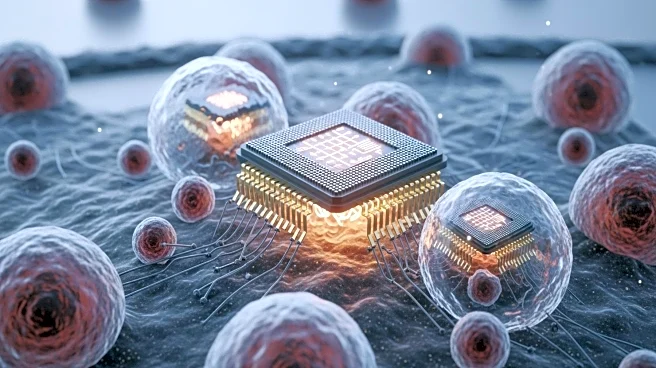What is the story about?
What's Happening?
Researchers in Switzerland are advancing the field of biocomputing by developing computers powered by living cells. This innovative approach involves creating neurons from human skin cells, which are then formed into clusters called organoids. These organoids can be attached to electrodes, allowing them to function as mini-computers. The process, led by Dr. Fred Jordan at the FinalSpark lab, aims to replicate aspects of artificial intelligence learning while using significantly less energy than traditional methods. The concept, often referred to as 'wetware,' is still in its early stages but shows promise for future applications. The organoids, although not as complex as a human brain, share similar building blocks and can respond to simple commands when connected to a computer system.
Why It's Important?
The development of biocomputers represents a potential shift in how computing technology could evolve, offering a more energy-efficient alternative to current silicon-based systems. This innovation could have significant implications for industries reliant on data centers, which are known for their high energy consumption. By reducing energy usage, biocomputers could contribute to more sustainable technological practices. Additionally, the research could advance understanding in fields such as neuroscience and artificial intelligence, potentially leading to breakthroughs in disease modeling and drug development. However, the technology is still in its infancy, and its ability to compete with or complement existing silicon-based systems remains to be seen.
What's Next?
As the research progresses, scientists will continue to explore the capabilities and limitations of biocomputers. Key challenges include maintaining the viability of organoids, which currently lack blood vessels and have a limited lifespan. Researchers are also investigating how to trigger learning in the biocomputer's neurons to perform more complex tasks. The field may see increased collaboration with other institutions, such as Johns Hopkins University, which is also exploring similar technologies for medical research. The potential for biocomputers to complement existing AI technologies could lead to new applications in various sectors, including healthcare and environmental monitoring.
Beyond the Headlines
The ethical implications of using human cells in computing are an area of ongoing discussion. While the technology offers exciting possibilities, it also raises questions about the nature of consciousness and the definition of life. As biocomputers become more sophisticated, society will need to address these ethical considerations, ensuring that the technology is developed responsibly. Additionally, the cultural fascination with science fiction and its influence on scientific innovation is evident in this research, highlighting the interplay between imagination and technological advancement.















